#suddenly we are the evil nationalists?
Explore tagged Tumblr posts
Text
I added Yemen in pins (But the Haitian flag is not perfect anyway, because it is really difficult to draw)
No, but seriously, the Haitian flag is one of the more difficult ones because of the details

And I had to draw this pseudo-comic, because seriously, we live in an absurd situation when real anti-Semitism is ignored, but the fight against genocide suddenly becomes anti-Semitism, yes, it makes sense, there's no point
The proof may be the arrest of a Jew for anti-Semitism after burning the Israeli flag, which says a lot that we live in an absurdity…
Seriously, suddenly Poles got active and started calling me an anti-Semite for talking about Israel's crimes (Yes, the same Poles who blame the Jews for making movies turn out to be crap)
Let's face it, being called an anti-Semite by Poles is ironic, but okay, to come back, seriously, even Poles are crazy about Zionism, and that says a lot about a country where anti-Semitic graffiti appears in larger cities (Because in my city there is "Evil" graffiti and actually, no one knows what it means, graffiti is mysterious because it is everywhere, and no one knows what it means, but luckily I haven't come across any anti-Semitic graffiti in my city)

But coming back, it's fucked up that those fighting "Anti-Semitism" didn't get involved with nationalists, as if they didn't give a damn…
Seriously, years ago they would have called you "Oversensitive" or "Julka from Twitter", and today they pretend to be against anti-Semitism, it's just so false
It just irritates me that they pretend to be false allies of Jews -_-
Attention, it's time for graffiti called "I'm an idiot and I will punish it without any restraint", i.e. graffiti

Wait a moment… Nationalists have entered here, SAVE YOURSELF!

Oh no, it's from 2013… I was twelve then (Almost, because my birthday is in July)

"Jews eat children, Jadowniki eat Jews", the first part as you can see, but even I don't understand the second part…
No, but seriously, I don't understand the second one, what the fuck does that mean? Who are Jadowniki?
Why do they eat Jews? I'm seriously asking, now my ASD mind will wonder what this means…

"Jews are plundering Poland", if that were the case, maybe it would finally be normal and not a pathology…

"Mom, I'm a fascist", I hope his mom disinherited him

I may not be an expert, but that's not how you play hanged man…

(Sorry for that shitty joke, but that was the only thing that came to my mind, because it's sick, and then you see these Poles calling you an anti-Semite because you support Palestine… Yes, you don't look like a hypocrite or anything)

"A Jew painted anti-Semitic graffiti", I see a website that caused a drama about the new He-man being too gay, as if the old one was ultra hetero…

"Fuck the Jews", I would praise the crossed out flag of Israel, but there were probably no anti-Zionist intentions here… So, minus for anti-Semitism, and the crossed out flag of Israel won't save it, burn it

"Confederation against Jews", I will not argue here, this ruling platform is anti-Jewish (and anti-intelligentsia), so it was supposed to be anti-Semitic, but it is true…

Yes, the guy with the fire extinguisher who attacked the poor Hanukkah candles was from this ruling platform, so yes, it's true, he is against Jews
So yes, now realize that these Poles now have the nerve to talk about anti-Semitism…
#free palestine#free gaza#free armenia#free congo#free free palestine#free haiti#free hawaii#free plaestine#free sudan#free syria#free yemen#palestine will be free#ukraine#antisemetism#antisemitism#antisemites#antisemitic#jews#jew#jewish#judaism#poland#oc's#israeli occupation#my ocs#oc art#oc artist#oc design#oc#ocs
7 notes
·
View notes
Text
Since I had to block a bozo who defends the hate of Russian civilians, (redjaybathood), here is proof of anti-Russian sentiment towards civilians, it's not propaganda and you ain't a tankie for calling it out.
OK, so I have to respond. Firstly, my criticism doesn't mean "I think Putin's behaviour is the right thing."
Let me ask you something. Why don't you lame Chinese civilians for their government? Why don't you call them names? Their leader is also a communist who threatens other countries. Why aren't Chinese civilians considered tankies? Why don't North Korean civilians get treated like they're part of the problem? Cherry picking.
Next, you're literally doing what the OP and many other people are calling out. Hating the civilians for existing and living in a dictatorship.
And since you freaked that I didnt send the links even though you can look it up yourself (meaning you're lazy), fine. Here we go. Now let's see if you try to accuse me of lying. This is the sentiment that lead to the Japanese internment camps which everyone agrees were wrong, but I know people would cheer for Russian ones. There's a LOT of Russia-bashing, believe it or not.
And serious actual hate crimes and attacks. All called "propaganda" by bigots.
That's arson if you don't speak German.
If a foreign minister needs to call you out, it's not propaganda.
NOTE: Dubs being put on hiatus, Russian non politial products like snacks and drinks being removed or given WARNINGS in stores, none of that happens to other "evil" countries like China. Selective outrage? I'd say so. And literal paragraphs about hate from the Wiki page.
All of these are civilians who are being treated like shit on the ASSUMPTION that if you're Russian, you must hate peace. Dictators are not the people. People are brainwashed. You don't have the right to judge the peopleof a dictatorship because they aren't born evil, they're taught to obey the dictator. It happened with Hitler. It happened with Stalin. It happened with Mussolini. It happened with Pol Pot. It happened with Milosevic. It happened with Hirohito. It happens with Xi. It happens with Kim Jong Un. Why is it that when it happens with Putin, and ONLY with Putin, are the civilians suddenly just as problematic as the leader? You can't judge an entire nationality based on a select number of people you've seen who agree (or pretend to agree, as many may not actually agree but pretend. If all you view them as is cowards, but you don't hold the same values to other citizens of dictatorships, you are in fact, a BIGOT and it's not problematic or propaganda or false to say so. I made myself very clear. If you still disagree that's your problem and you are a toxic person. Jesus fucking Christ)
Tell me again how being Russian automatically makes you a bad person and how civilians aren't victims just because they are living in a corrupt country. You judge the entire population based on what fringe nationalists and some brainwashed people say. Blanket statements about an entire nationality or race are NOT okay. Peoplewho criticizes this aren't automatically pro-tyranny. Not that you care or believe that.
As a bonus, let's talk about how America and Canada (my country) used to HATE UKRAINE, and they had Ukrainian internment camps.
Your reaction to this should NOT be "I don't think Ukrainians deserve peace". BOTH RUSSIA AND UKRAINE DESERVE PEACE AND TO BE FREE FROM HATE. THE HATE GOES IN ALL DIRECTIONS. THAT'S THE REASON WAR IS A THING. PUTIN NEEDS TO STOP FIGHTING. PEOPLE NEED TO STOP JUDGING CITIZENS OF A DICTATORSHIP FOR BEING FROM A DICTATORSHIP. THE MORE RUSSIANS THAT CALL OUT PUTIN ANY WAY THEY CAN THE BETTER. ALL OF THESE STATEMENTS CAN AND SHOULD CO-EXIST AND I YOU DON'T THINK SO, YOU ARE PART OF THE PROBLEM. "BUT THEIR LEADER!" "BUT I'M UKRAINIAN" "BUT LISTEN TO WHAT PEOPLE SAY" "SHUT UP TANKIE" "ORC/RUZZIAN AREN'T SLURS THEY'RE TRUE". ARE NOT EXCUSES. The orcs and Ruzzians are Putin and his lackeys, not the people who live in said tyrant's cities. Obviously people should help Ukraine, that's absolutely fine. But people should not do or say anything the people above have said. It's pretty easy to find out of touch comments on Twitter and Quora that blanket the entire population as the same "evil commie tankie orc zombies". People calling out this stuff aren't trying to make a competition of "who has it worse" when in fact war harms EVERYONE.
That's all I can say. Don't like this? Then you should really think.
11 notes
·
View notes
Note
And it's not just in the Voidship either. Needlessly antagonizing others has been his MO from the very beginning. Both in his own KG and in other blogs, from Survivor and Reach for The Stars.



Exactly, no matter what universe we are in, you are ALWAYS like this Kokichi! You constantly push people's buttons even when its to your own determent!

And I do not approve of you firstly summoning that tentacle monster on myself and Yomiuri and making Kaede choose, which led to him suffering unnecessary torture. Then you tried to drag me into a Love Hotel against my will which I'm sure counts as rape. And lastly, Kirumi almost killed me because you couldn't keep your mouth shut and had to annoy her when she was trapped in that suit!

Also, the reason you even tried to ruin the Concert wasn't because you got a tip that Ego Suits were gonna be distributed and that Kaede might go berserk, no its because you thought with Kaede performing, you have a chance to be with me, and when I picked Himiko as my dance partner, you flipped out!

Also you started to sabotage the concert even BEFORE Shuichi went with Himiko, as it was only after Sannoji tried to kill them both they decided to join up for the dance!

And the Kirumi in a Suit situation...yes you didn't like the fact Shuichi was gonna die but what the FUCK were you thinking? She was clearly not herself at the time so what did you think would happen if she was asking people if they were pure Japanese or not on if she would go full nationalist?

All of those are bad...but they DO NOT top what has happened here. You gave the Voids the idea to ruin Christmas, and for what? You haven't even told us your reason, so we are gonna assume you just wanted to cause more chaos for the heck of it!

We are definitely gonna kill Sannoji for what he's done, but if you don't fess up, you will follow him!

I....I....

*Suddenly Kokichi is spanked from behind* I'll talk! I'll talk! Don't spank me again!

I didn't even do it that hard!

When I got here...I tried to be nice to everyone...I saw it as a chance to be more to myself...but everyone keeps assuming the worst of me. "Oh look its the lying shithead" "You are a liar, we don't trust anything we hear from you!"

Everywhere I go...everyone kept treating me with scorn and hatred. Even Shumi...even you kept being suspicious of me.

So I thought...why bother? If people assume I'm a evil scheming mastermind, then its time to be a lying evil scheming mastermind and do everything I could for my own amusement!

Besides why are you guys so upset for? Nothing in here matters! You don't die here, you wake back in the real world all good as new!

This is all just a dream after all...so why should I care about what goes on here?

True we visit here in our dreams but if that's so why do you care about what other people say to you, why do you care when I get hurt?

We JUST got done telling off Yomiuri for not tuning out the Anons, so why are not tuning out the people who say you are a liar?

Because NOBODY IN HERE CARES ABOUT ME! THEY ALL ASSUME I'M A LIAR!
#danganronpa#dr#sketch#kana's christmas adventure#danganronpa v3 killing harmony#v3#kaede akamatsu#shuichi saihara#maki harukawa#miu iruma#kokichi ouma#oh looks like kokichi has his reasons now#and its the old everyone hates me so why should i care#expect he does care#but doesn't tune them out#his actions contradict themselves#almost as if he's being a lie#face consequences for once kokichi#or get choked
2 notes
·
View notes
Text
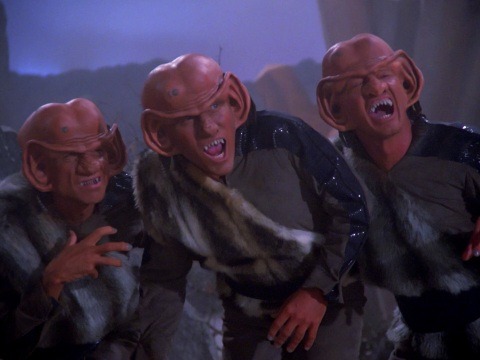
Star Trek: The Next Generation, 104 (Oct. 17, 1987) - "The Last Outpost"
Written by: Herbert Wright Directed by: Richard Colla
The Breakdown
The Enterprise crew are in pursuit of the mysterious never-before-seen Ferengi, when their ship suddenly powers down while orbiting an uncharted planet. Initially Picard is given the impression that a Ferengi weapon is involved, when they receive a call from the Ferengi themselves admitting to having the same problem. Ultimately it’s determined that the power drain is coming from the planet’s surface, so both ships send a landing party to investigate while everyone else is forced to wait in hope for a solution that doesn’t involve freezing to death.
Once on the Planet, the Ferengi immediately begin attacking with what appear to be whip-phasers (the default weapon of any strong capitalist society), and a fight ensues until it’s interrupted by some sort of all powerful deity-guardian (from a long extinct civilization. Pretty standard ancient space stuff) who decides to test which crew is more honourable-and-just. Since the Ferengi are buffoonishly evil, Riker is able to make short work of the test, and the Guardian is pretty much like, “Sorry for the trouble with your ship, here’s your power back” before vanishing. The end.
The Verdict
The first half of this episode mostly works at successfully building suspense over new unknown enemy. And then we finally meet the Ferengi and things get… unintentionally hilarious? Yes, I think that’s about as generous as I can be. By the time we meet this episode’s obligatory all-powerful space deity/guardian, the story has hit peak moral-lesson-of-the-week platitudes.
1.5 stars (out of 5)
Additional Observations
Picard dismissing old earth nationalistic values, and then immediately implying his ancestor’s flag was better than the American’s, seems a little off-brand for a starfleet captain.
Data getting caught in a Chinese finger trap is dumb. I know it’s being played for comedy, but it just falls flat. And Riker’s “let’s beam a box of these over to the Ferengi” gag at the end is equally dumb, and an obvious knock off of the ending from ‘The Trouble With Tribbles’.
Picard’s an asshole: While grappling with the reality of the entire crew freezing to death, Dr. Crusher considers the possibility of sedating Wesley to ease his inevitable suffering, to which Picard gives us us the gem: “He has the right to meet death awake.” …I mean, sure I guess he should be allowed to make that choice if he wants, but do do you think it might be worth asking him? Going out peacefully in my sleep seems alright to me, and it’s not like you can’t just wake him up if you all survive. Picard must REALLY hate that kid.
After watching episodes like this I can understand why so many people hate the Ferengi. Thankfully DS9 does a much better job with them.
#star trek the next generation#TNG season 1#The Last Outpost#retro review#star trek review#star trek#star trek tng#ferengi#tv shows#tv review#tv series review#90s tv series#90s tv shows#herbert wright#richard colla#episodic nostalgia
4 notes
·
View notes
Text
"If I don't vote for Kamala, what do we do about Trump?"
"Just assassinate him successfully then! No need to vote for her if he's dead!"
Excuse my French, but some of y'all are putain d'insupportable.
Okay, cool. You killed Trump.
The problem doesn't stop there.
Because now, you have a large group of people with both money and power in the United States who supported him who will turn around and blame every minority group ever for violence in the country and decide to vigilante their justice the same way an assassination would.
Trump isn't the whole fucking problem.
He's only a part of it.
The whole problem is that this country has been spirally into fascism for many years, bit by bit, chipping away at the seams since even before Obama became president. And after we got a Black president, well, the racists and white nationalists ramped it up, pushing propaganda, psyops, putting "their boys" in higher positions like they already were.
Trump is at the forefront because of how he stacked the Supreme Court, and he's the one white Christian nationalists want to rally behind because he successfully put people in place to reduce rights for anyone with a uterus and increase them for corporations (remember the Chevron case and how the current SCOTUS overruled it).
This is so far beyond Trump.
He's just been the most successful so far.
Killing him won't end it. He's not some big bad villain who contains all the evil.
If anything, his murder would embolden the forces behind him into action, just like it did on January 6th, 2021. He is already more popular now than days before because the assassination failed (and no, it's not some conspiracy, please shut up).
Y'all hardcore getting on my fucking nerves, cause I know at least some of this is because people don't want to vote for someone who doesn't exactly fit everything they want in the world.
You're never, ever, going to get that person unless you run for office yourself.
I could go down the whole spiel of parasocial expectations and human nature, but I'm not. I'm really not in the mood for it.
It fucking sucks that we have to vote between several evils and that third parties are substantially less popular than the major parties, unlike in other countries where they do have two main parties but the other parties are also important and often get elected in high positions.
But that's not gonna change suddenly. We're not gonna suddenly get that in time for the election. Trump's current presidential legacy follows over 50 years of systemic effort (like, I'm talking back beyond Reaganomics).
Some other efforts have also been systemic, like the right to homosexual marriage! And that was a good systemic effort! But gay marriage didn't become legal overnight! And voting for third parties or getting the Perfect Candidate also won't happen overnight!
And now, at the Nth Hour, is this really the time you want to take a stance in neutrality by not voting, hoping someone will kill Trump, and not paying attention to the millions behind him?
So fuckin unserious.
I'm not telling anyone who to vote for. That's not my prerogative here.
But, I am saying, if you don't want Trump or what he represents, stop hoping for the perfect storybook savior and work with what you have.
Merde.
1 note
·
View note
Text
yk what's weird to me about pre-KnS yamaguchi manga (save for cybermomotaro) is that despite leaning so much on like those edgy loner nationalistic guy main characters they alway are written in a way that almost would suggest an arc to end up like something closer to kakugo yk?
like yes kakugon't (rei HAJC) got the rising sun-every man for himself-violent retaliation and angeris perfectly fine-group thinking is for pussies things going on but by the end he goes forming decent friendships and cooperation in a way that suggests a betterment of his character. with garan, he's also another loner samurai hunting evil and degenerates bc, in very anachronistic yamaguchi fashion, rehabilitative justice/prison system doesnt do it for him and Bad People should Die bc they cant fundamentally change and hippies and love is for pussies (again). but in like the last chapter we find he raises orphans to avoid them becoming trash adults or criminals. so, which of the two is it? is it nature or nuture with this series.
then all pre-KnS works end very suddenly, and specially with HAJC and Garan, at these very odd points where they seemingly contradict the main character's already so-wrong-they-cant-be-serious opinions but dont ever really change anything despite being aware and calling attention to itself...
so on those terms idk if i feel as strongly to keep saying he did like a 180º on his take on the matter when starting KnS, but it cant say the contrary either, for now...
0 notes
Text
Love how transphobes and anti-indpendence people are trying to make us seem like some evil nationalists that only want independence because we're xenophobic or something
As if England isn't one of the most nationalist, xenophobic and racist countries in the world. As if there isn't a lot of fucking xenophobia towards scottish people in England. As if England isn't literally trying to block a law to help trans people
Sorry we don't want you blocking our laws just because you are tories and terfs
#like the amount of national pride in england is sickening#but when we want to have independence#suddenly we are the evil nationalists?#scottish independence#scottish politics#scotland#trans rights#uk politics#england blocking the scottish gender reform act
5K notes
·
View notes
Text
I love how anti-Russian people use Russia's past to spread hatred towards Russians and anyone who looks at Russians even slightly positively (Because many of them are LGBT+ and is anti-Putin) is suddenly considered "Spreading propaganda about the good Russian"
Information for you: According to this logic, Ukraine is also bad, because Ukrainians, before they gained the land, were bad people and raped Polish women, yes, you heard right, this is the history of Ukrainians, and does it mean that what Putin is doing is fucking good? No it doesn't and it shouldn't fucking matter because these Ukrainians who are alive today are not the Ukrainians who raped Polish women, you fuckers
Seriously, Ukrainians did a lot of bad things to Poles, which you want to erase to show that all Russians are bad because "Their history shows them as evil"

"Even before the outbreak of the German-Soviet war, both Polish and Ukrainian political and military organizations operated in Volhynia. They were in sharp conflict with each other. After June 1941, quite a large part of the Ukrainian political circles in Volhynia decided to cooperate with the Germans - to such an extent that that Ukrainians constitute the main part of the auxiliary police forces in this area. They participate in carrying out the Holocaust of Jews and take part in the pacification of villages - both Polish and Ukrainian"

"As the months of the war pass, the tension in Polish-Ukrainian relations systematically increases. In 1942, we are dealing with increasingly frequent physical attacks on the Polish population - both the intelligentsia and the peasant population. In the fall of 1942, about six thousand Ukrainians leave the German auxiliary forces and join the underground, which causes a new, very important military and political factor to appear in Volhynia. The structures of the Ukrainian Insurgent Army are being formed, which remains in a very close alliance or is simply politically subordinated to the Organization of Ukrainian Nationalists, a splinter group led by Stepan Bandera. Poles decide to enter the place abandoned by Ukrainians. This is done in consultation with the structures of the Polish Underground State and not to help the Germans, but to create an opportunity to defend against attacks from those Ukrainians who went underground. Ukrainian political groups, but also part of the Ukrainian population, view the takeover by Poles of functions previously performed by Ukrainians as extremely negative"
You see right, Ukrainians hurt Poles, so according to this logic you should hate them…
The history of Ukraine is quite bloody (And that's probably why Zionists think that Poles collaborated with the Nazis, so eh…)
So should I be anti-Ukraine because evil ancestors hurt Poles? No, there's something wrong with your head
What Putin is doing is inexcusable, but I blame Putin because he is a shitty person
This turned out to be a series of posts, so you see…
But I can't hate someone for their country of origin or ethnicity, I hate people for supporting genocide, or I mention the problem (I compared Russians and Israelis in previous posts because I noticed a key difference that is ignored, which is trust in your government, so yeah...)
I don't like Russia and Putin, but that doesn't mean I have to hate Russians, because many Russians are wonderful people, just like Jews who are hated by Zionists and some pseudo-pro-Palestinians (Mainly with right-wing views…), let's stop judging people for their origin and ethnicity, and for what kind of people they are
1 note
·
View note
Text
SNK 139.5: Towards the Final Pages with no Final Answers
The final pages of the updated ending are bold, but I think ultimately more evocative than the original preliminary ending.
Even after the intensely polarized reader reception that took issue with the lack of storytelling precision and clarity when it was most needed, SNK chose to end with a decisively ambiguous symbol. In literature, a symbol is something that clearly means something -- but with the most "literary" symbols, their meaning cannot be absolutely defined; any attempted answer as to what a symbol represents has no finality or certainty, and interpretation will remain ever open to debate. A symbol both invites and resists interpretation.
Naturally, the immediate response to the symbolic tree on the final page is to try answering the invitation to the question, "What does it mean?"
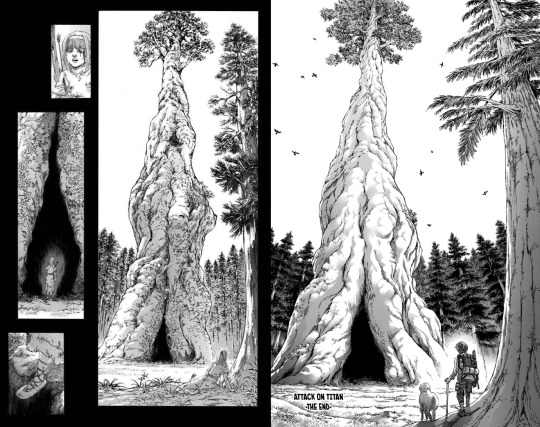
One prominent answer I've seen is that it symbolizes the continuation of the cycle of war and violence either because a) of the symbolic parallel to Ymir or b) on a more literal level, that it implies the actual potential revival of new era of Titans. A reasonable interpretation either way, but also, I think, an incomplete one.
The first reason for this is that "the endless cycle of war" was already clearly and powerful represented in the preceding panels:
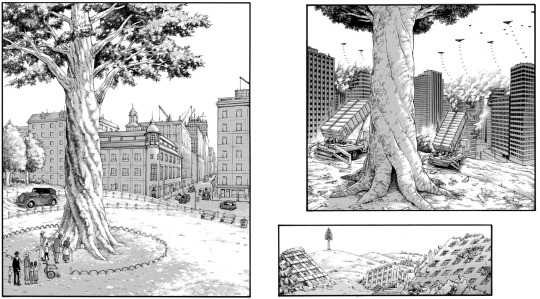
The cycle of war was already continuing in the decades or centuries before the child arrived at the tree. A culminating image symbolizing the persistence or resurgence of an era of war as the final panel would thus arguably be redundant and unnecessary.
Furthermore, the chapter is entitled "Toward the Tree on That Hill." If the tree were simply a symbol of war, by implication the chapter could equally be called 'toward the endless cycle of war'. But such a relentlessly bleak and tonally flat ending sentiment would be firmly incongruous with the story's recurrent conviction in the equal cruelty and beauty of the world -- a conviction that I believe it has been faithful to all the way to its end.
The Long Defeat
But while on this topic of war, let's linger a moment on the "cruelty" side and the consequence of this wordless construction and subsequent destruction of a city -- the most bold and possibly controversial additional panels that are also my personal favourite additions.
One objection that has emerged against this brief sequence of Paradis' apparent destruction is that it renders the entire story to be "pointless". Eren's 80% Rumbling, Armin's diplomatic peace talks between the remnants of the Allied Nations and Paradis, and before that, the proposal of the 50-year plan and Zeke's euthanasia plan... everything, to the very beginning to the Survey Corps' dreams of some kind of freedom; was it all for nothing? All that striving, that hope, that final promise bestowed upon Armin: was it all a pointless story? Even more radically, is the story suggesting that Eren might as well have continued the Rumbling to 100% of the earth? Was Zeke's euthanasia plan the cruel but correct choice all along? What was the point of rejecting the 50-year plan if that had a greater chance of success at preventing this outcome?

I think Isayama suddenly pulling back to such a long-term view of history to the scale of decades or even centuries into the future calls for a reorientation in attitude towards exactly what kind of story we have been reading. Yes, if the metric is Paradis' survival, maybe it was indeed all "pointless". But that's also to say that, on the broadest scale, SNK is a story about futility, that it is a deliberate representation of the struggle to make one's actions historically meaningful.
In the long view of history, all the events, from Grisha running beyond the wall to see the airships and the first breaking of Wall Maria to Erwin's sacrifices, Paradis' discovery of the outside world, and finally to the Battle of Heaven and Earth, it would all merely be a handful of chapters in the history textbooks of the future. A future in which war and geopolitical conflict will continue even without Titans. That does not mean that all paths to the future are equal -- the 50-year plan would not have put an end to Titans, and Zeke's euthanasia plan distorts utilitarian ethics into just another form of oppression; there are better and worse decisions that lead to more and less degrees of suffering, but no decision can ever be the final one.
The additional panels remind us that in history, there never exists a singular "Final Solution". The reason there are readers who vehemently support Eren to have flattened 100% of the world, and the reason the Paradisians supported the oppressive, authoritarian, proto-fascist Jaegar Faction under Floch and even after the Rumbling, is that because they want to believe that a Final Solution to end conflict exists and will work. They resist the fundamental uncertainty and complexity of the situation, instead preferring a singular, unified, and coherent Answer to Paradis' struggle to survive. I'm reminded of the scholar Erich Auerbach's theorization of why fascism appealed to many people during periods of political and social crisis, change, and uncertainty. Writing in exile after fleeing Nazi Germany, he observed that:
"The temptation to entrust oneself to a sect which solved all problems with a single formula, whose power of suggestion imposed solidarity, and which ostracized everything which would not fit in and submit - this temptation was so great that, with many people, fascism hardly had to employ force when the time came for it to spread through the countries of old European culture." (from Mimesis p. 550)
This acutely describes the Jaegar Faction's rise to power and continued dominance in Paradis. But their promise of unity, of a single formula to wipe out the rest of the world either literally through the Rumbling, or to dominate them with military force, is a false one. Even if Eren had Rumbled 100% of the world instead of 80%, history would still go on. The external threat of the world may have been eliminated, but internal conflict and violence would still continue onward throughout the generations born on top of the blood of the rest of the world. Needless to say, out of all the options, Eren's 80% Rumbling is the very epitome of perpetuating the cycle of violence as it creates tens of thousands of war orphans like Eren once was, and it would justify employing violence for one's own self-interest to an extreme degree. For the generations to come that would valourize Eren as a hero, it would set a dangerous precedent for what degree of destruction is acceptable for self-defence -- nothing short of the attempt to flatten the entire world. It is no surprise that Paradis would meet a violent end when its founding one-party rule of the Jaegar Faction has their roots in such unapologetically bloody foundations.
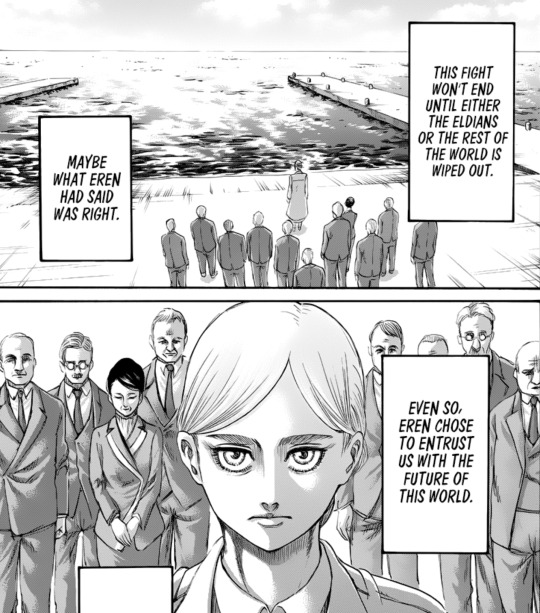
Neither the 80% Rumbling nor the militaristic, ultra-nationalistic Jaegar faction that come to govern Paradis are glamourized as the "correct" solution to ensuring Paradis' future. (This can also put to rest any accusations of SNK's ending as "fascist" or "imperialist" propaganda, since the island's modern nation that they founded ends in war. All nations must fall eventually, but not all do in such blatant destruction). Importantly, neither is Armin's diplomatic mission naively idealized as that which permanently achieves world peace. No singular or unifying formula can work because reality is complicated. Entrusting oneself to seemingly simple Answers is simply insufficient, even if they are ideals of peaceful negotiation; that method may work given the right conditions, but the world will always eventually complicate its feasibility.
After all in the real world, there's the absurd irony that some in the West had called the First World War "The War to End all Wars". These days, WWI is merely one long chapter in our textbooks just a few pages away from the even longer chapter of the Second World War that is followed by all the rest of the conflicts that have followed since then even with the establishment of diplomatic organizations like the United Nations. In this sense, showing Paradis' eventual downfall is perhaps the only way to end such a series that is so concerned with history, from King Fritz's tribal expansion into empire, the rise and fall of Marleyan ascendency, and finally of the survival and apparent shattering of Paradis.
From its beginning to its end, SNK has poignantly evoked J.R.R. Tolkien's conception of history as The Long Defeat. In one character's words, "together through ages of the world we have fought the long defeat". That is to say, "no victory is complete, that evil rises again, and that even victory brings loss".
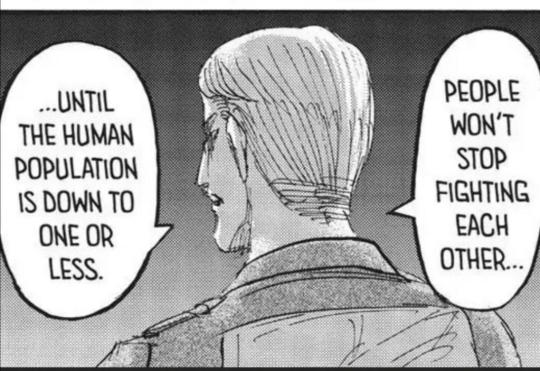
No heroes, only humans
Eren's desperate, fatalistic resignation to committing the Rumbling, along with the characters' rejection of all the rest of the earlier plans to ensure Paradis a future, are merely the actions of human beings to that began with the need to find not even necessarily a Final Answer, but at least an acceptable and feasible one for the time being. But the characterization of Eren's confusion, childishness, and regret in the final chapter is startlingly real in how it demonstrates how, all along, we have been dealing not with grand heroes, but simply people who have no answers at all. SNK has always been about failures - and often ironic failures; it has always been a story about painful and frequently futile struggle.
People make mistakes, they can be short-sighted, selfish, biased, immature, petty, and irrational, and I think the ending follows through with depicting the consequences of that.

Erwin's self-sacrifice before being able to reach the basement (and his regression to a childhood state in the moments before his death), Kenny's futile chasing after that universal compassion he had seen in Uri, Shadis never being acknowledged by history despite his final heroic action, and so on -- these stories of ironic, futile failures are still meaningful in their mere striving. Eren's ending and Paradis' demise despite Armin's endeavour to ensure them a peaceful future are entirely consistent with this.
SNK certainly follows the shounen trope in which young individuals are bestowed great power and correspondingly great responsibility, and must then reconcile the burden of possessing that greatness on which the fate of the world depends. Yet it is equally defined by its representation of the state that us normal human beings confront everyday: the struggle against the apparent powerlessness to enact any meaningful or lasting change at all. Simultaneously, this helpless state does not exempt us from the responsibility to act in whatever small capacity we are able to resist oppression, ideological extremism, and the perpetuation of violence.
Towards That Symbol
That was a rather long but vital digression about the additional "construction and destruction" pages. To return to the issue of the symbolism in the final panel, here I will turn from seemingly affirming the tree as symbolizing the cycle of violence, towards what I think is the greater complexity of what the tree might "actually" symbolize.
As I've said above, I don't believe that the final chapter title is synonymous with 'toward the endless cycle of war'. In tone, theme, and characterization, SNK has always been defined by the tension between cruelty and beauty, the will to violence and the underlying desire for peace, and the rest of the contradictory impulses that all simultaneously coexist. The end of SNK as a whole commits to a similar lack of closure, ambiguity, and interpretive openness.
So far I have rambled on about only a view of the perpetual "cruelty" of history. Where, then, is the "beauty"?
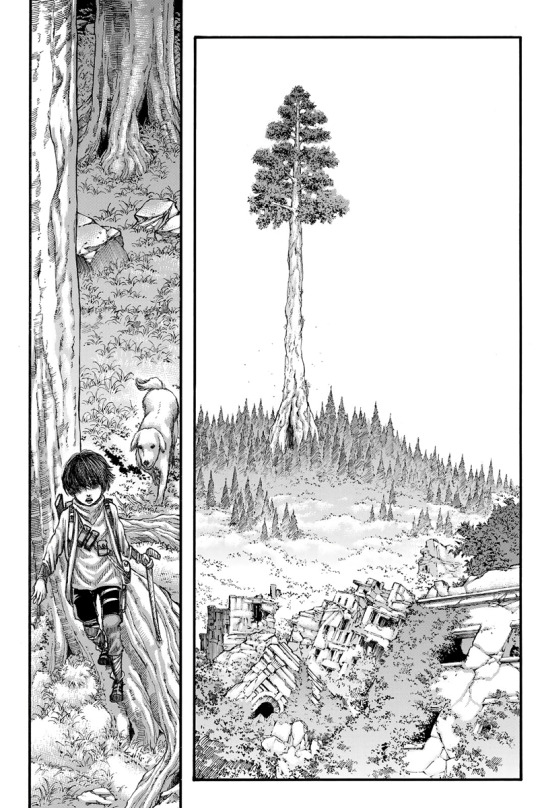
In short, the "tree = cycle of violence" interpretation is obviously based on how that this tree recalls the original tree in which the spine creature, as the source of the power of the Titans, resided. But it's worth first considering, what exactly is this creature? We seem to get our answer in the chapter that most precisely crystallizes the dual "cruelty and beauty" of the world:
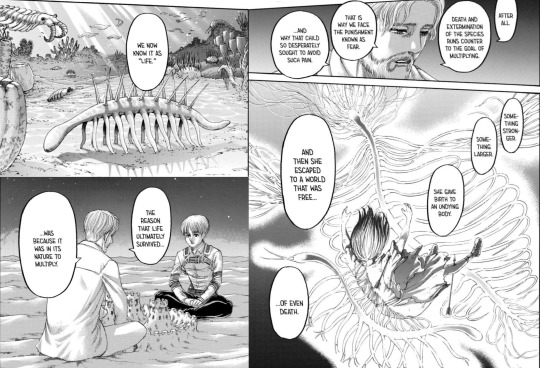
The spine creature might be said to be life itself. Or more specifically, the will of life to perpetuate itself, for no reason at all but for the fleeting moments in which we feel distinctly glad to have existed in the world.
The creature at the source of the Titans, and in extension the Titans themselves, is neither inherently a positive or negative, "good" or "evil", creative or destructive force. It's both and all of those at once. As with any power, the Titans were merely a tool that was put to use to oppressive ends.
So as I now suggest that the tree at the end is symbolically a "Tree of Life", I don't at all mean "life" in the typically celebratory or optimistic sense: rather, I mean it in the ambiguous, ambivalent, uncertain, and complex sense that has been evoked throughout the above discussion of the inevitable continuation of war.
The title "Toward The Tree on That Hill" is derived from its associations with Eren and Mikasa, but more specifically of course, from Armin's affirmation of existence. However, the tree as a symbol of existential affirmation is undercut with the revelation that, despite Armin's diplomatic mediation between the Allied Nations and Paradis, the island nation never escapes war just as no nation in the history of the earth has ever fully escaped war.

The image of Armin running toward that life-affirming tree by the end becomes twisted and complicated, as the image of the anonymous child approaching the Tree of Life evokes both awe at its beauty and grandeur, and a deep dread at the foreboding of its cyclical return to Ymir's tree that signalled the beginning of a bloody era.
And I think that is precisely it: Life is not some idealized, beautiful vision that we always want to run toward; it is also ironic, complicated, and dreadful. It is ambivalent. Like a literary symbol, the meaning of life cannot be pinned down absolutely. The tree therefore becomes itself a symbol of uncertainty, of an open future that is cyclical both in its beauty and war.
As a final observation, it is surely no coincidence that, the small, black, birdlike silhouettes of the war planes destroying the city from the sky is replaced by the similarly small black silhouettes of birds in the final panel.

If the birds represent freedom from war, the irony is that the immediately surrounding land appears to be one completely empty of people save for the exploring child; it is a freedom attained only without people's presence. Yet at the same time, a child from some existing civilization has reached it; perhaps it is freedom that they have reached, perhaps it is something else that they see in the tree. What is it that they were looking for? What does the tree and its history represent for the child, and what does it mean for their future? Alternatively, does the child-in-the-forest imagery negatively recall the warning that the world is one huge forest of predator and prey that we need to protect children from entering?
Rather than providing answers, this tree embodies all of the potential questions, and all of the potential answers. These possibilities will unfold themselves into an uncertain future beyond the chapters of history that Eren, Armin, Mikasa, Zeke, Erwin, and all the rest of the characters were part of and left their mark on; and whatever future this child will witness or create, it will similarly be one of the struggle against futility, as the journey begins anew with each generation in every new era. Neither - or both - hopeful or despairing, the final image of this tree, just like life itself, contains those innumerable irresolvable tensions as it gestures towards all possibilities, both oppressive and free.
#snk 139#snk ending#snk extra pages#snk meta#snk#snk spoilers#brain dump#this is a pretty personal interpretation so if there are any logical inconsistencies i don't know what to do with them#yes the execution of the final arc/chapter is flawed but it's still very conceptually interesting#i still have my disappointments but overall i've made my peace with it#translating my tangled thoughts into words however imperfectly: i think that's what freedom is all about#snk manga#aot#aot 139#aot ending
235 notes
·
View notes
Text
Our teacher at uni specialised in medieval history was saying that from the sources we actually have, it is very likely that it even wasn’t assassination, just a bunch of drunken guys decided to show off their skills with swords (Vaclav being included, not that a bunch of drunkards went after sober him). And that they dug him up and proclaimed him saint suspiciously fast after his death. Something about how christianity worked at that time and that medieval nationality mostly wasn’t “i’m from this country and my ancestors were from this country and we speak this language” or however is nationality defined today, but it was decided by what saint belonging to which country were the one you worshipped/prayed to/swore your allegiance to. That suddenly there being someone who could be proclaimed to saint was very useful for political situation and further insuring the solemnity of czech principality
If any of you is at Upol, docent Stejskal’s lessons are the goldmine if you want to unlearn the whole “uwu we never did anything wrong, the evil germans are responsible for everything bad that ever happened to us” nationalist propaganda pushed by communist regime and often remembered by basic school and highschool’s history teachers. That guy is honestly amazing and if every teacher was as inspiring and putting things to context as him, it would solve 90% of problems of our schooling system.
Something morbidly funny about the patron saint of Czechs, a nation known for being betrayed by allies multiple times throughout history, being a guy whose brother murdered him by, you guessed it, stabbing him in the back
255 notes
·
View notes
Text
Since the hiatus is over, I'm gonna rant a bit about Stand Still, Stay Silent and how the author's take on her new religious views are impacting things.
So if you don't read that webcomic,sorry for this. I'll put it under a read more if it gets long (which it probably will).
So first of all, I'll clarify that these are my views and I know this is a HEATED thing rn and I'll basically just say I'll be willing to like... debate about it with anyone who wants to but I also personally reserve the right to turn off anon/block you if you get nasty with me or if it sounds like you aren't actually interested in hearing what I'm saying so much as spreading your own beliefs around.
Secondly, I want people to understand that I personally am American. I am speaking from an American perspective. I understand that Minna is not American. I may be conflating our experiences in a way they cannot be. However, I also recognize that author intent and audience interpretation are two very different things. With this in mind, I also recognize and understand that intent is nothing when compared to impact. So though I may be speaking from an experience that may not be true at all for Minna, I also recognize that my feelings and perspectives are valid as an American audience member. Something being written by a Finn does not negate the fact that it is available to read regardless of geographic location, and that it's impact will ultimately reach further than just her own bubble. So this post is me speaking about impact on myself as an American audience member, not intent on her part.
First I'll say that the bunny comic - Lovely People - is, in my opinion, objectively in poor quality and taste. Not even taking into account my own views on religion yet. It was very tone deaf about the history of Christianity and oppression and completely ignored how Western Christianity plays a major part in a lot of modern oppression and social problems that the comic tries to address. The pseudo-apocalyptic theme of the social credit system had the potential to be a very interesting and thought provoking direction! Social media has fucked with our society and our mental health in a way that we really need to address!
However, the comic made the Christians the only group we see experiencing oppression from this system in the story. This effectively does two things in tandem. One, it fails to address just how negative of an impact the social credit system would have on us all. Looking around at our way of interacting with the world now, we're still almost all of us suffering for the way things are. We have incredibly high social anxiety, people are encouraged from a young age to conform aggressively to beauty standards and share all their personal details online, and - most notably to my next argument - anywhere an individual lacks privilege is exploited by our society and they are put under a microscope, and are ultimately aggressively punished for being part of a marginalized group. Not born with the physical traits considered acceptable by Western standards of beauty? Tough luck. Not physically or mentally able to participate in the current system in place? Tough luck. Not willing to conform to strict gender roles? Identify as a marginalized gender or sexuality? Not willing to be quiet and secretive about it? Tough fucking luck. But the ONLY group that is shown to be oppressed at ALL in the bunny comic is Christians.
What makes this even more tone deaf is that, Two, it is thus completely blind to how Western Christianity has played a direct and aggressive role in supporting the oppression of these other group in our current fucked up system. I'm NOT saying Christianity is evil or that anyone who practices the faith is bad. Not at all. Religion is, at it's core, a beautiful thing. But the fact stands that MANY people in positions of power have used their Christian beliefs as a tool to oppress others. In America especially (yes I'm speaking as an American and I acknowledge that) Christianity is THE mask used by the far-right and the oppressors to spread their ideologies. Even white supremicists and nationalists ultimately will try to argue that white people and the US are God's Chosen Ones which is why they're TOTALLY RIGHT in doing the terribly things they do.
Making a comic about how a social credit system causes oppression and then showing that oppression as EXCLUSIVELY happening to Christians is not only in EXTREMELY poor taste, it is directly harmful. It is the same message and behavior that a lot of Christians use constantly to gaslight marginalized groups that they are against. "Oh I'm oppressing you? No actually I'M oppressed because I'M CHRISTIAN and you just can't handle the fact that you're going to hell for not repenting for existing!"
Even if those are your true beliefs. Even if you genuinely think that Christians are oppressed and that anyone arguing against you is refusing to repent. Does spreading information in that way really seem effective to you? Does it really seem loving and caring to you? To sit there and talk about how others are always hurting you, but you aren't hurting anyone else at all by telling them they're going to hell for being?
I'm digressing. But my point here is that the comic is in incredibly poor taste, and I genuinely will never understand why people expect non-Christians to take the message of "you're going to hell if you don't conform to my beliefs and also I'm oppressed" positively.
Moving on to Stand Still, Stay Silent...
She has said several times that she does not intend to change the path SSSS has been on from the beginning. This is honestly not comforting whatsoever.
First, this is definitely because - even before the recent developments - SSSS was always very shallow imo. I loved it! Don't get me wrong! But a major part of that love was because I genuinely thought it was building up to something bigger; I thought it was eventually going to go deeper. I now understand that that was never the case. It's a shallow story with a lot of potential that I don't think was ever going to get fully explored.
Now here's the thing. Part of me is really upset about that. What I thought the story was going to be I now see will never happen. But a bigger part of me is frankly happy about that now. Because, like I said up top, intent and impact are very different. If she were to suddenly go unexpectedly deeper than the story has been, I wouldn't trust that there wouldn't be shitty subtext and more of the same tone-deafness as the bunny comic. Whether intentional or not.
And even if she hadn't recently converted to Christianity. The fact that she is someone who is susceptible to these ideas and values tells me what kind of a person she really is anyway, regardless of religious identity. Which, frankly, would mean the subtext would still be shitty. I don't trust it. I don't trust her.
So frankly, people have every right to be suspicious of how SSSS may be impacted going forward. She can say that it won't be all she wants. But either the story will go deeper - like I had always hoped it would - and there would inevitably be an inseparable link between her values and beliefs and the themes of the story, OR the story will never go deeper at all which would mean imo that it would ultimately fall flat as a story.
People are allowed to be disappointed by this. People are allowed to be suspect of how she may potential work harmful themes into the comic going forward - whether intentionally or not. I'm allowed to be wary of this, especially as someone who has had VERY bad experiences with Christians who have tried to tell me the same things she made clear in her bunny comic.
#ssss#stand still stay silent#lovely people#minna sundberg#yes im tagging this#and ill probably regret it later#but damn i needed to get this off my chest#i needed to get this out there bc i NEED people to understand why i#and so many others#are upset by this
123 notes
·
View notes
Text
Crooked Timber's Ministry for the Future Seminar
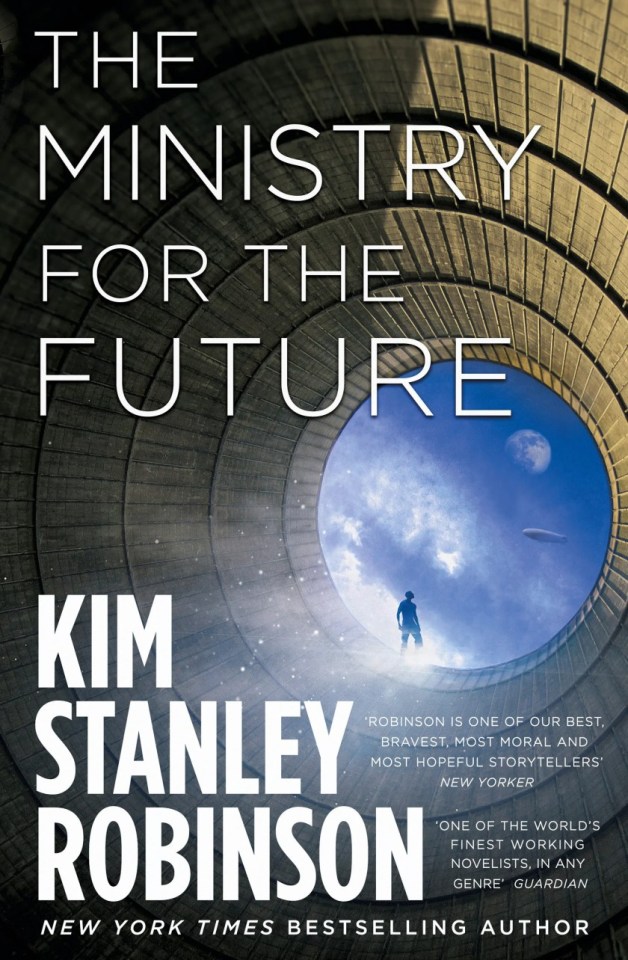
Kim Stanley Robinson's 2020 novel "The Ministry for the Future," is a fierce imaginative work. Robinson doesn't just depict a future beyond the climate emergency and capitalism itself, he depicts the specific, wrenching transition that takes us there.
https://www.orbitbooks.net/orbit-excerpts/the-ministry-for-the-future/
As I wrote in my review, the (variously attributed) maxim "It is easier to imagine the end of the world than the end of capitalism," isn't quite right. Imagining postcapitalism is an easy lift, but imagining the path to that world is *very* hard.
https://pluralistic.net/2020/12/03/ministry-for-the-future/#ksr
Robinson didn't leap into this project - he's been working up to it for literally decades, at least since the publication of the "Three California" books, which include one of the most uplifting novels I've ever read, PACIFIC EDGE:
https://memex.craphound.com/2015/01/15/pacific-edge-the-most-uplifting-novel-in-my-library/
Meanwhile, his 2312/Aurora/New York 2140/Red Moon novels constitute a kind of rangefinding exercise, starting 300 years the future and then walking his projection backwards to find a plausible route to get there.
https://memex.craphound.com/2017/03/18/new-york-2140-kim-stanley-robinson-dreams-vivid-about-weathering-climate-crisis/
But all these brilliant novels really seem to be warmup exercises for the main event, The Ministry for the Future, which depicts the intermeshed systems of economics, politics, geoengineering, streetfighting and tragedy that might rescue us from dying in our own waste-gases.
It's urgent, frightening and hopeful, raising as many questions as it answers.
These questions are now taken up in one of Crooked Timber's "seminars": a series of interdisciplinary essays about the book, culminating in the author's response.
https://crookedtimber.org/2021/05/03/the-ministry-for-the-future-seminar/
The first of these essays comes from Maria Farrell: "What is Ours is Only Ours to Give," about the digital technology at the core of TMFTF, namely blockchain and independent social media. Farrell is characteristically incisive on these elements.
https://crookedtimber.org/2021/05/04/what-is-ours-is-only-ours-to-give/
Her thoughts here tie back to her notion of the "prodigal tech bro," and how we should treat the tech industry's claims of genius with skepticism - even when those claims are cloaked in confessions of being an EVIL genius.
https://crookedtimber.org/2020/09/23/story-ate-the-world-im-biting-back/
The next essay is Oliver Morton's, digging into the solar geoengineering in TMFTF, and the "sustained contradiction" such an effort might produce - relieving the urgency of addressing carbon production and accumulating new policy debt in the process.
https://crookedtimber.org/2021/05/05/on-solar-geoengineering-and-kim-stanley-robinson/
Morton's a very good choice for this role: his 2016 book on geoengineering, "The Planet Remade," remains one of the best technological, economic and political overviews of the subject:
https://memex.craphound.com/2016/05/04/the-planet-remade-frank-clear-eyed-book-on-geoengineering-climate-disaster-humanitys-future/
Next is Jessica Green's "Can the World’s Bankers Really Save the Climate?" which drills into Robinson's fictional carbon markets, where central bankers are pressed into service to save the planet in an unjust (but rapid and necessary) compromise.
https://crookedtimber.org/2021/05/06/can-the-worlds-bankers-really-save-the-climate/
Green's an expert on climate and finance, so she's as good at spotting the cards that Robinson palms here as Farrell is with tech. Green credits Robinson with identifying the "true sources" of climate obstruction, but thinks he's missed the mark on how to deal with them.
Next is the Roosevelt Institute's Todd Tucker with "Ministry for Your Future Soul": praise for KSR's depiction of the scientific process, scientists, policy wonks, and the progress of policy. Tucker calls Robinson a "Gramscian science fictionologist."
https://crookedtimber.org/2021/05/07/ministry-for-your-future-soul/
Robinson's "dynamic imagination...makes the book valuable to policy nerds" because "fiction can inform planning," specifically through that exercise of starting with the outcome we want and then working backwards to imagine the steps we need to get there.
This "backcasting" method has many and varied adherents. It's the method that Anonymous used to create its notorious ops, as documented in Biella Coleman's 2014 book on the ensemble:
https://www.spectator.co.uk/article/the-anonymous-ghost-in-the-machine
But it's also the method that Amazon uses for new product decisions: starting by writing the press-release announcement and then working backwards to sell the org on developing the product to go with the press-release:
https://www.inc.com/justin-bariso/amazon-uses-a-secret-process-for-launching-new-ideas-and-it-can-transform-way-you-work.html
Next is Belle Waring's "Sudden Tempest of Ultimate Summer," which goes straight for the political violence in TMFTF, and KSR's seeming discomfort with this violence, coupled with his evident belief in its necessity.
https://crookedtimber.org/2021/05/10/the-sudden-tempest-of-ultimate-summer/
As Waring points out, alongside all the nonviolent tactics Robinson depicts, there is a lot of (mostly offstage) violence - and when that violence is onstage Robinson pivots away from it, subjecting the Davos hostages to Powerpoint presentations instead of a firing squad.
Waring also grapples with the intimate, gendered role that violence plays in the book - the relationship between heroine Mary Murphy and the traumatized antihero Frank May, who holds her hostage, and whom Murphy subsequently dedicates herself to.
The next installment - Half the Earth? - comes from John Quiggin, a trained agricultural economist who delves into Robinson's depiction of a successful "Half Earth" transition in which humans surrender half our planet to other animals.
https://crookedtimber.org/2021/05/11/half-the-earth/
Quiggin is pretty bullish on the possibility of this happening, noting that we have more than enough food as things stand and that human fertility is already below the replacement level everywhere except Africa, where it's still trending down.
For Quiggin, vacating half the Earth is do-able: "We are, suddenly and surprisingly, at a point in history when radical change seems not just possible but likely."
Next is Olúfẹ́mi Táíwò, whose "What’s In Our Way?" - a frank look at how KSR depicts north/south politics, and the realism behind a scenario in which mass death in India leads to little change, while the erasure of LA sets change in motion.
https://crookedtimber.org/2021/05/03/whats-in-our-way/
Táíwò calls this "equal parts fatalism, pragmatism, and optimism," and while he acknowledges its realpolitik, he also calls upon us to imagine something better - led by the global south, rather than the "elite of the elites."
There are three more responses to come: from Henry Farrell, Suresh Naidu and Robinson himself - a contribution I'm eagerly awaiting. Based on my own experience with the CT seminar on my novel Walkaway, this will be an intense project for him.
https://crookedtimber.org/2017/05/10/cory-doctorow-seminar/
For all that the seminar raises serious questions about whether TMFTF can be a roadmap (as opposed to an inspiration) for a transition to a better, sustainable future, the book remains an awesome, towering accomplishment, a beacon and a delight.
What's more, Robinson has walked back his early 2020 idea that TMFTF would be his last novel for an indefinite period while he worked on nonfic (about the Sierras and conservation). He says he's back to writing novels, which is *outstanding* news.
I read TMFTF as I was writing THE LOST CAUSE, my post-GND climate novel about truth and reconciliation with white nationalist militias and plutocrat wreckers.
You can read the prologue here:
https://www.patreon.com/posts/new-decameron-36398964
That book is now done, and reading TMFTF and thinking about its boldness, its brilliance and its flaws made me reconsider my own story. Imagining the end of capitalism remains the hard problem of our future, and Robinson has done sterling work on that problem.
The Crooked Timber seminarians are carrying on the work Robinson started in TMFTF, shoring up its weak spots and calling attention to its sturdy frame. Taken together, the CT essays and Robinson's novel are a heady tonic for a world in transition.
26 notes
·
View notes
Text
Battle Tendency Liveblog: JJBA Ch. 65-66
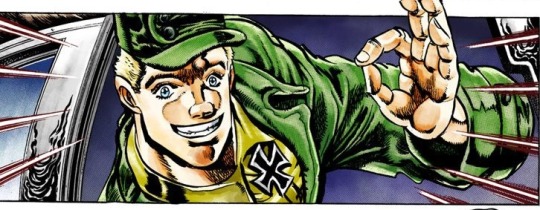
This is the start of the “Ultimate Warriors from Ancient Times” arc, but I want to focus on these two chapters because they feature Mark. I’ve got a lot to say about Mark under the cut, but the short version is that he’s a lousy Nazi and he deserves everything that happens to him.
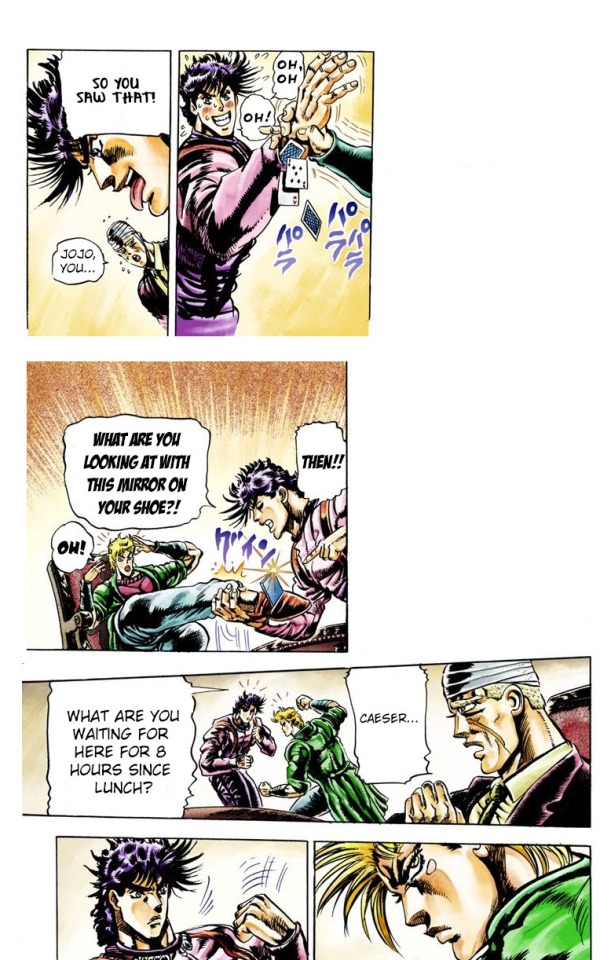
A large chunk of Chapter 65 is just Caesar hanging out in Joseph and Speedwagon’s hotel room. They try to play cards, but they’re both cheats. This wouldn’t bother me at all until Speedwagon points out that he’s been here for eight hours, and never bothered to explain why. You’d think Joseph would have demanded an answer a long time ago, since he’s not known for patience.
As it turns out, Caesar’s been waiting for Mark, a buddy of his in the German Army. Stroheim was in the German Army too, and he told Joseph that the Nazis had discovered three other Pillar Men in Rome. That’s why he and Speedwagon came here, after all. Well, Caesar’s an Italian, and Italy and Germany are allies, so Caesar managed to persuade the Germans (through Mark) to let him take a look at the Pillar Men. So in this chapter, Mark rolls up in a car and drives them over to the site.
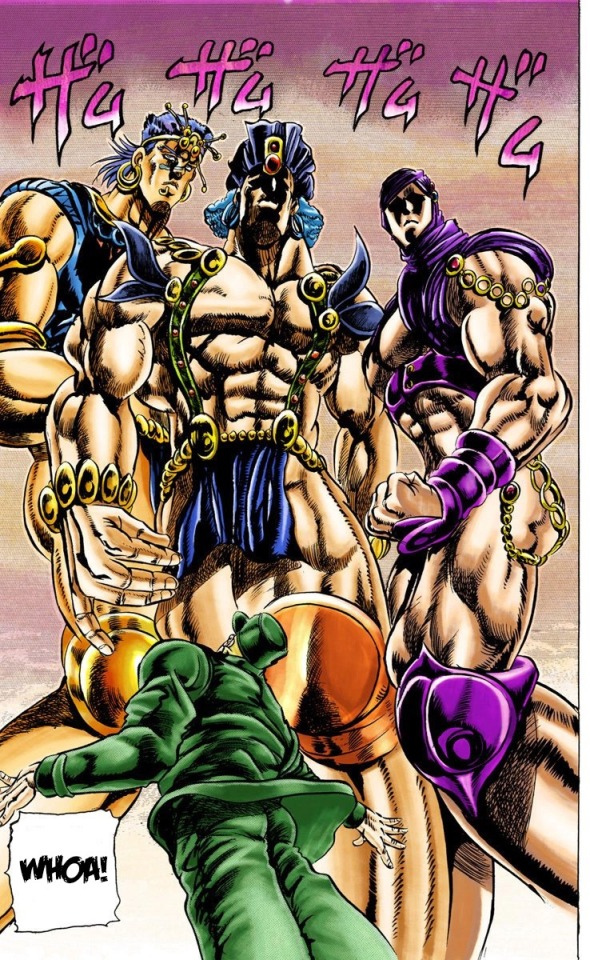
But we already know what happened at the site in Chapter 64. The Pillar Men have already reawakened, and all the Nazi soldiers stationed there have been slaughtered. When Mark leads our heroes into the catacombs, they find the remains of the Germans, while Mark bumps into the Pillar Men themselves. (Note: the above image is not to scale).
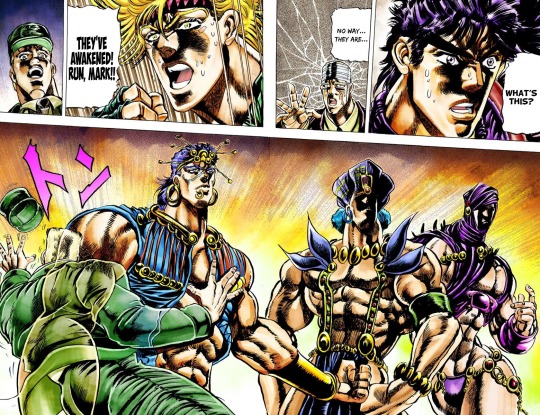
The thing is, bumping into the Pillar Men is hazardous to your health. We saw that vampire grab Santana and large chunks of his body were completely absorbed. The same thing happens to Mark, only faster, because Wamuu doesn’t even slow down as he walks past him. He just walks right through Mark and half of his body is gone.

So when I first watched the JoJo anime, it was right after I watched the Hellsing Ultimate anime, and I got a kick out of seeing two completely different anime takes on vampire lore. Let’s face it, the Pillar Men are presented as something beyond mere vampires, but they’re basically just super-vampires, not so different from Alucard in Hellsing. And both make use of the Nazis, except in Hellsing, the Nazis are the villains, while in Battle Tendency, they’re kinda sorta allies. Stroheim is clearly a bad guy, because he killed his prisoners and tormented Speedwagon, but Mark is presented as a completely sympathetic person. He’s got a sweetheart back home, Caesar’s the one who introduced them, and he’s planning to get married the next time he goes back to Germany. And for his very brief appearance in JJBA, he’s completely friendly and helpful to the heroes. We’re supposed to feel very sorry for him when he gets killed here.
Part 2 is my favorite, but I think this stands out as it’s biggest flaw. I get the idea. Hellsing was dealing with a lot of dark themes, and the protagonists were horrifying in their own right. So Kouta Hirano used the Nazis as villains to humanize his vampire characters. By contrast, Hirohiko Araki seems to be using the Nazis to dehumanize the Pillar Men. They’re so evil that even the Nazis look halfway decent by comparison. At least the Nazis are human, with human loves and fears and honor. The Pillar Men kill Mark without even noticing him, and Speedwagon likens this to a human stepping on an ant. I get what Araki is trying to do here, but it rings hollow. Fuck Mark, and fuck his Nazi fiance. The first time we see him, we get a close up of his Iron Cross medal, with the damn swastika in the middle of it. We’re supposed to buy into the idea that he’s “one of the good Germans”, and it’s 1938, so World War II hasn’t officially started yet, so somehow Mark is supposed to be cool. But no, I don’t buy it.
Let me go off on a little sidebar and try to explain how we got here. Battle Tendency was published in 1988. Back then, Hitler had been dead for decades, and Germany had been partitioned into two countries, East and West Germany. The Nazis seemed to have been consigned to the dustbin of history, and as time passed, pop culture grew more comfortable using the Nazis as historical villains in stories like this one. There was a sense that yeah, the Nazis were really bad, but they were gone now, and they would never come back. I think there was a similar mentality surrounding the Soviet Union after the U.S.S.R. dissolved. By the 2000′s there were all sorts of internet memes about Nazi stuff and Soviet stuff and it was rationalized as harmless envelope-pushing.
The problem is, it doesn’t seem so harmless in 2021, when Russia is a autocracy that meddles in U.S. elections, emboldening white nationalists in the process. The “alt-right” fanatics who marched in Charlottesville in 2017? The rioters who stormed the Capitol building this past January? Those assholes probably wouldn’t call themselves Nazis, but neither did the Nazis. They called themselves “National Socialists”, because they were trying to make their ugly policies sound more legitimate. The same holds true for “alt-right”, “economic nationalist”, “Qanon”, “truther”, and so on. They’re just new labels for the same old horseshit.
I don’t want to judge Battle Tendency too harshly, because it’s the product of a different time, an era when people could at least pretend that Nazism was one of the few problems that we didn’t have to worry about any more. The same mentality can be found in Hellsing. The Nazis in Hellsing are definitely villains, but the conceit is that they’re all immortal vampires or werewolves, because that’s the only way the Nazi menace could possibly exist in 1999. Otherwise, they’d all be dead of old age. Battle Tendency is set in 1938, so it takes the liberty of presenting sympathetic Nazis, because we already know they’ll be defeated in the end, right? We might as well see what makes them tick.
Araki may have thought that using Nazis in a story set in the 1930s would be no different than using Napoleonic French soldiers in a story set in the 1800s. And in the long run, that might be true, but I don’t think we’re there yet. In the here and now, it’s aged rather poorly.
Of course, just because Caesar and Joseph feel bad for Mark doesn’t mean I have to. And Araki may have been more self-aware than I’m giving him credit for. Nazi Germany wanted to set itself up as the Master Race, and in this fictional world, the Pillar Men have come to do the same thing, only they’re much, much further ahead of the game. I think part of the point of Stroheim and Mark was to contrast the Nazis’ supreamcist attitudes with Kars’ ambitions. For all of Stroheim’s boasting, he’s helpless against Kars’ might. But at the same time, for all of Kars’ power and brilliance, he’s ultimately chasing the same pipe dream as Hilter and his followers.
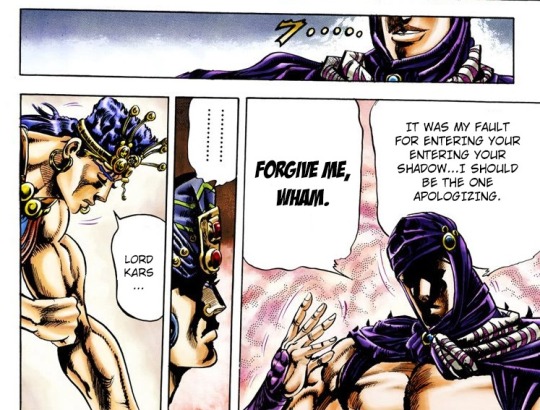
Let’s get back on track. While the good guys react in horror at what happened to Mark, the Pillar Men just stand around nearby and discuss their situation. They completely ignore our heroes, just like they ignored Mark. Kars wants to locate the Red Stone of Aja, because it’s the secret ingredient to the mask he designed that will make them immune to sunlight. Esidisi doesn’t understand how the stone helps their plan, but he’s totally on board. But as they head out, Wamuu suddenly attacks Kars, because Kars stepped in his shadow, and apparently Wamuu just lashes out at anyone who does this, friend or foe.
Wamuu is deeply sorry for this, and begs to be punished, but Kars apologizes instead, because he knows about Wamuu’s whole shadow thing and he feels that he’s the one who made the mistake here. I really love this exchange, because it defines the Pillar Men so well. As indifferent as they are to human lives, they respect one another a great deal. Kars is the leader, but he still treats the other two guys like close associates. He needs Wamuu’s sharp senses and keen warrior instincts. Meanwhile, Wamuu and Eisidisi practically worship Kars like a god. They’ve literally followed him around the world and across thousands of years in pursuit of his vision.
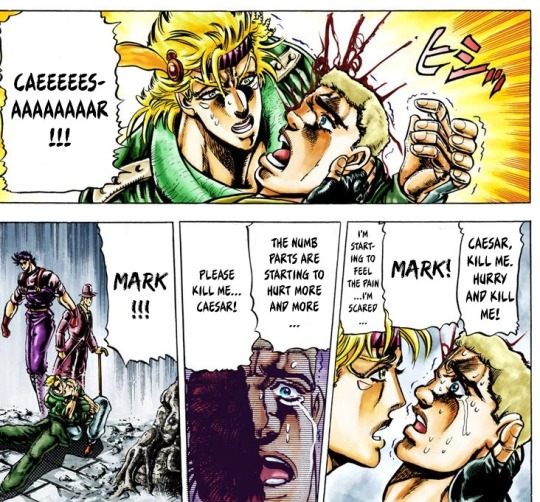
So yeah, if the goal here was to use Mark’s suffering to make me hate the Pillar Men, it doesn’t work. The Pillar Men are evil, sure, but they’re pretty cool bad guys. On the other hand, Mark looks ridiculous here, with Caesar holding and talking to half of his body. This looks like something out of a Tex Avery cartoon.
I mean, let’s set aside the whole Nazi thing for a moment. Why should I feel sorry for Mark? Because he’s in pain? He got cut in half! He should have died instantly! Because he was going to get married? We only met this guy one chapter ago! Because he’s Caesar’s friend? Well Caesar’s kind of a jerk too.
Anyway, Mark begs Caesar to kill him and end his suffering, so Caesar uses the Ripple to stop his heart. Or the half of it that’s still there, I guess.
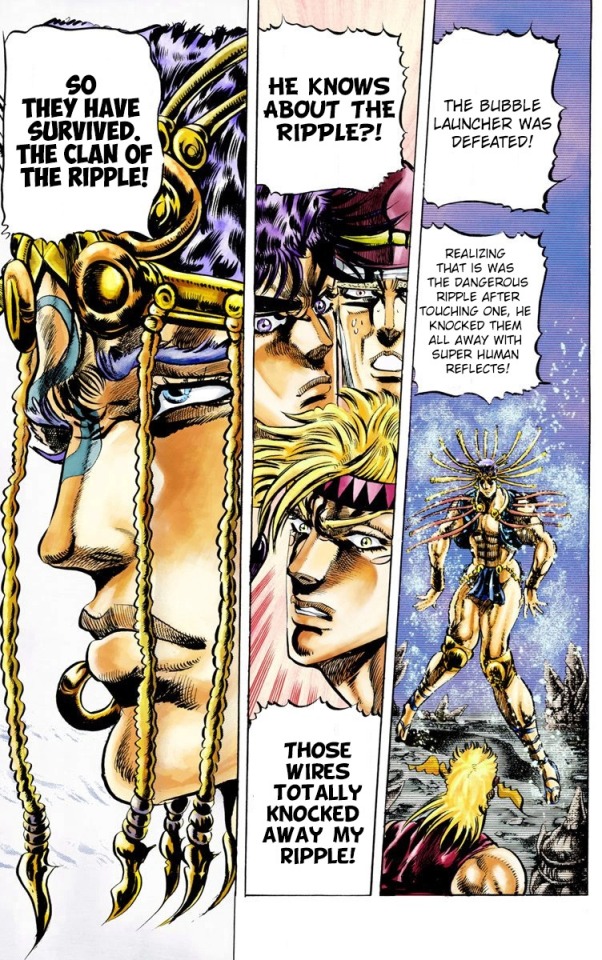
Okay, so the whole point of Mark’s death is to really get the good guys fired up to battle the Pillar Men, right? Okay, Caesar tries to take them on, and he opens with the Bubble Launcher, the same move he talked about earlier. It didn’t beat Joseph, but Caesar’s Hamon power does hurt Wamuu’s skin, which is more than Joseph managed to do against Santana.
The Bubble Launcher is supposed to surround the opponent with dozens of soap bubbles charged with Hamon energy. Wamuu can’t escape without touching them and getting hurt. But Wamuu just sprouts all these long braids from his head and clothes, and swings them around with superhuman precision to know the bubbles away without hurting himself.
As it turns out, these Pillar Men are familiar with Hamon. Santana was surprised to encounter Joseph Joestar’s powers, but Wamuu and the others have fought Ripple users in the past. And Wamuu’s more intrigued than worried...
Oh, as one final aside, on the car ride to the catacombs, Speedwagon asked Caesar if he tried to use the Ripple to destroy the Pillar Men before they woke up, and Caesar explains that it didn’t work while they were in their dormant state. Remember, at the very start of this story, Speedwagon called Straizo because he wanted someone to use the Ripple to destroy Santana before he could wake up. Now we see that even if Straizo had agreed to his request, it wouldn’t have done any good. Sunlight doesn’t seem to kill the Pillar Men so much as it makes them turn to stone, and the Ripple only hurts them while they’re flesh and blood. So the only way to kill them seems to be by using Hamon in a direct confrontation, and that’s a tall order...
#jojo's bizarre adventure#battle tendency#joseph joestar#caesar zeppeli#robert e o speedwagon#mark#wamuu#kars#esidisi#get wrecked mark
21 notes
·
View notes
Note
do you think the netflix series will stick to the books messages of anti war, family and friemdships? i hope not because those messages are what makes me like the books so much, also i hope the netflix fandom don't memefy the stories like they did with renfri, her story is supposed to be tragic and show how revenge corrupts people but the fandom just treats it like "uwu bisexual feral sword woman wants to kill big baddie wizard hehe"
correction: it's supposed to be “i hope so,” not “i hope not,” lol i can't spell
sadly, i don’t think that the netflix adaptation will stick to the themes of the books at all and here’s why.
first reason why: ciri
in the first season, they took out ciri and geralt meeting in brokilon. that is just the most unforgivable action they could have taken. that scene is literally what defines the entire series being about ciri, the child of destiny, geralt’s daughter who is the whole point of everything. they gave her more screentime, but less significance. she also is played by 18 yo freya allen who is acting as a 14 yo ciri, which blurs how she is supposed to symbolize childhood. instead, they went for a spunky sort of young teenage girl, which ciri becomes later (in the care of yennefer and during around the time of thanedd), but it is significant that she was a CHILD when cintra fell to nilfgaard, because it traumatized her for life and is the point of no return for her. because geralt thought that by fathering her, he would introduce her to death, but instead, the opposite occured - by deferring her, she was introduced to death. ciri loses her innocence, she loses the abilty to be a child. now she will continue to fixate on revenge for the entire saga, until she loses everything, absolutely everything. the witcher is a tragic story but it only manages to have this story because it is dominated by this theme of a lost childhood, surrounded by themes of family, vulnerability, revenge, destruction, violence...
in the netflix series, we receive approximately none of this. ciri’s trauma is more treated as a “wake up call” because she’s such a “privileged princess” who doesn’t know about or care that her beloved grandmamma committed mass genocide (what???). this is treated like something ciri needs to overcome, thus it is actually a good thing that she is seeing people being murdered left and right in the name of imperialist conquest!
second reason why: geralt
geralt in the books is a kind person. he is a pacifist. his profession is to kill, he ocassionally punches people so hard they die (he did this to save his best friend from being sliced open), and other acts of badassery, but inside, he does not want to kill and is opposed to it. this is the man that refused to slay a giant bug-like monster because he didn’t feel it was necessary (the witcher equivalent of trapping a house spider in a glass and slipping a piece of paper under it, then releasing it outside, instead of squashing it with your sandal). this is the man that felt himself unworthy to be yennefer’s lover, because he was afraid he couldn’t feel love in the same capacity she could. this is the man who pushed his best friend away on a dangerous quest because he was terrified that he’d be harmed and he’d suffer, and it would be his fault. and as mentioned, this is the man that deferred his daughter, his daughter who he genuinely loved and wanted to protect no matter what, his daughter who he legitimately raised a conflict with the queen of brokilon over, because he was terrified that he would bring violence and death into her life. this geralt is an introspective, pragmatic man. he cares deeply about the welfare of others, and the only way he can even do his job is to justify it though morality and codes of conduct which he makes up himself because he is so obsessed with not harming the innocent. he spares and befriends many “monsters” (post-conjunction creatures) and only slays the ones that genuinely pose a threat to the innocent and are usually are not creatures capable of rational thought. in the first book in the voice of reason 5, geralt literally states that he won’t kill innocent creatures.

and he continues this philosophy throughout:
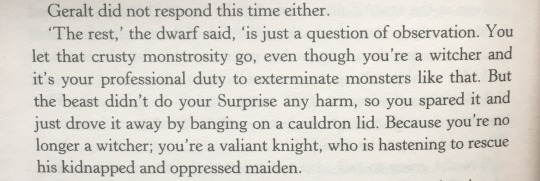
he doesn’t kill dragons:
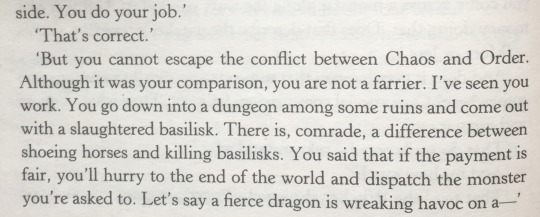
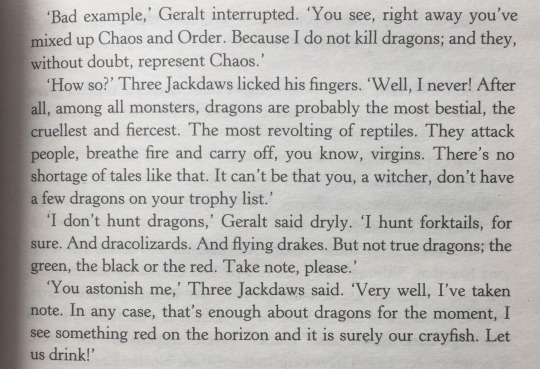
he advocates for dudu’s innocence:

he only was wary of regis because he was mistaken and thought he was going to harm dandelion in this moment:
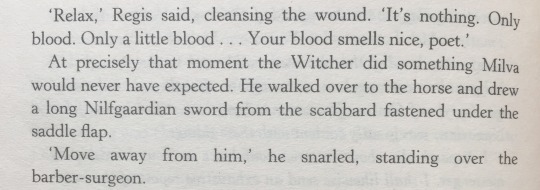
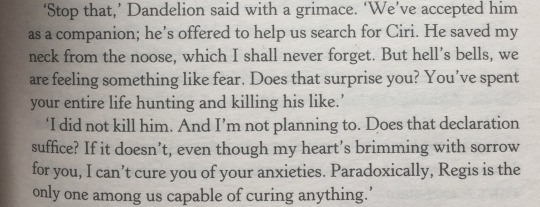
in the netflix adaptation of the witcher, what is the first thing that we see him do? kill a monster brutally and without remorse. he doesn’t talk about his motivations behind it or why he felt justified to kill it, or why the monster was a danger in the first place. he just kills it and this violence defines him. later in the show, we see him antagonize and mock torque (when in the books he asked dandelion NOT to do just that) and he also punches dandelion right in the stomach. even when geralt was the most mad at dandelion in the books, he never did physical harm to him. ever.
the netflix show is representating a very different man. some have argued that they will try to develop him later on, but that is too late. geralt in the books was a good person from the very beginning for a reason.
third reason why: cahir.
the anti-war and anti-imperialist themes of the books hinge upon the concept of universal humanity and understanding that violence has its own motivations and reasons. cahir i think is a very good example of how the witcher saga comments on the effects of nationalist sentiment / patriotism.
cahir in the books is a teenager or very young adult during the massacre of cintra (since he was no older than 25 in baptism of fire). even though he was also young and doing this only because it what was expected of him and he was intending to bring honor to his family, that does not change the effect that he has on ciri as a child. he enters her nightmares as an exaggerated version of what he was, even though he was scared, too. this demonstrates how impressionable youth are misguided into the military and people are made unaware of just how much violence they ensue.

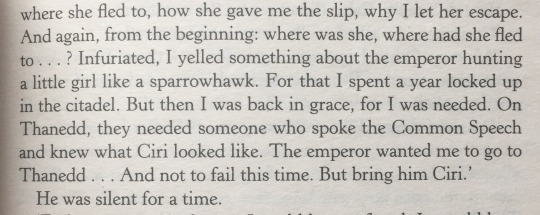
cahir is built up as this nightmarish figure, this horrifying man that ciri wants revenge upon more than anything else, and THEN he is revealed to also be a terrified youth. underneath the helmet, there was a terrified young man. that is an incredibly powerful image and metaphor.
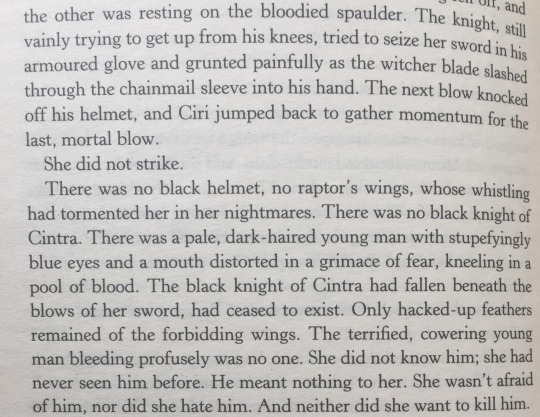
and what did the witcher netflix do? ... well...
cahir shows his face, he doesn’t have the symbolism of his imposing helmet anymore. he’s much older, eamon farren is 35 years old, 15 older than cahir canonically is, so he’s not someone who has had nationalist ideals imposed upon him unfairly by his parents and society, but rather a full adult who is established and making his own decisions fully in his own control. in the books, he stops pursuing ciri once she escapes, because he has a mental breakdown from the stress of his society and family’s expectations of success, and fear of harsh punishment he will receive. he goes to prison in the imperial capital for a year for failing. in the netflix series, he stops at nothing to get ciri, chasing her down constantly and enlisting the help of sorcerers, a doppler... it’s a whole evil entourage. cahir is not the vulnerable and noble-at-heart young man that he was in the books.
in the end, these are things that are too late to change now. these things can’t be developed upon to “fix” them. ciri cannot suddenly receive her character establishment as a child. geralt cannot suddenly become a caring father who has cared about protecting ciri since day one. cahir cannot suddenly become a young man influenced by his jingoistic society who was only in full plate armor because his parents told him to. these things are so essential to their characters that they are begun to be established immediately.
and yeah everything’s going to get memed on just like they did with renfri. no one discusses the elves’ situation in dol blathanna seriously, they just like laughing at how jaskier called them “pointy.” ciri isn’t discussed at all by the fandom except for being a token baby character. it’s dark times
228 notes
·
View notes
Link
1. Omnichrist Self-Deliverance Activation Front: Born of a therapeutic exercise wherein several people who believed themselves to be Jesus were put in a room together to discuss their mutually exclusive claims to messiahhood. They came out with the conviction that not only were all of them Jesus, but that every other human being on Earth was also Jesus and had yet to realize it. Aggressively missionary and rapidly expanding, its self-actualization rhetoric appealing in particular to younger single mothers. The Activation Front has been accused of kidnapping and cult-style conditioning, however these accusations have been deemed baseless by panels of experts who may themselves be Activation Front members.
2. Dark Marxism: A contrary offshoot of Marxist analysis which holds that Capital is in fact a god incarnating itself through digital technology and totalizing cybernetic systems of control. It further holds that resistance to this god is blasphemous, and that the only place for humanity in the coming order is to usher in and behold its world-devouring glory. Espousing Dark Marxist beliefs is currently trendy among young finance and tech professionals.
3. Wealth-Hack Immortalism: A combined religion and suicide pact that emerged from an anime imageboard. It argues on the basis of many-worlds theory and quantum immortality that if adherents make a sincere attempt at killing themselves because they don't have enough money they will be translated into a universe where they gain enough money that they will no longer intend to kill themselves (leaving a corpse behind in this world in the process). It also has a culture of cryptocurrency investment and pump-and-dump scams. Drops in the price of favoured currencies are blamed on "ascended brothers" trying to convince their remaining peers to follow them to immense wealth, popularity, and romantic success with women. Those who fail to kill themselves are shamed as "will-mogged" and "genetically destined to be wagie" by their peers.
4. Les Fleurons Glorieux: An ultra-nationalist Canadian civic religion founded by a follower of Helena Blavatsky in the late 19th century. They claimed to channel the ghost of Sir John A. Macdonald, as well as the principality of Canada, who told them to gather true patriots to be the heroes of coming centuries. The Fleurons venerate this principality as a necessary national intermediary to God, as well as a pantheon of great Canadian figures. Their lobbying led to Ontario government buildings being required to have a shrine to the principality of Canada maintained somewhere within (often on a top shelf in a less-used closet). Politically the Fleurons lean towards federalism and autarky. Fleuronic rites include poetry readings, parading the flag, wearing turn of the 20th century clothing, reenactments of the defeat of the United States in the War of 1812, and ceremonial fur hunts.
5. Crucifixion Truthism: A branch of American Evangelicalism with even closer than usual political ties with Israel. Its central tenet is that it is not the Jewish people who are to blame for Christ's crucifixion, but rather Palestinians, and so any treatment of them by the Israeli government is justified. Several Truthists have been implicated in "demolition tours", vacations where they rent armoured bulldozers and drive them through the Gaza Strip.
6. Immanentized Virtual Utopianism: A religio-techno-political project kicked off by a collective of "tankie" hackers inspired by Cosmism. Rather than the outer space of Cosmism, they were convinced that human salvation lied within the inner space of virtual reality. They pooled their resources and technical expertise to begin construction of a commune-facility where everyone could be plugged into a majestic simulated reality (as well as feeding and waste disposal tubes) where all their needs and desires could be met without limit. Despite early success with their invention and patenting of the "saccadic mouse" the full dream of the commune has yet to be realized, and is currently realized only in the upper echelon playing solar-powered video games all day while their acolytes roll them to prevent bed sores from forming.
7. Eternally With Herism: A support group-turned-religion that sprung up after the election of Donald Trump. E.W. Herism maintains that Hillary Clinton is both the incarnation of the transcendent maternal principle, as well as the true winner of the 2016 American election. However due to peoples' lack of faith in her we were cursed to perceive an illusory world where she did not. Practices to perceive this true reality include guided meditation, imbibing deliriant-infused wine, and ritualized brunch. Since the election of Joe Biden many adherents of E.W. Herism believe that due to their diligence the illusory world has graduated from hell to a sort of purgatory.
8. Psychophenotypism: Suddenly erupted into existence and popularity on a forum for the involuntarily celibate during an argument over "taking the pink pill" and "transmaxxing". It teaches that what we know about biology is a lie created to hoard "sexual market value", that the shape of the body is determined primarily by one's own mind, and that biofeedback techniques and pseudo-cognitive behavioural therpaeutic exercises could bring about a more complete transition than hormones and surgery. A helpful set of infographics was quickly put together to explain all this.
Several charismatic leaders appeared within the Psychophenotypic movement, who began to feud over the feasibility and desirability of "interracial transitioning", as well as hatred toward illiberal political beliefs for denying "the autonomous individual will". These feuds escalated into identity theft and physical violence, which attracted a subculture of anomie-afflicted street brawlers to bounce between the newly formed Psychophenotypic sects.
9. The Lord's Reclamation Brigade: An Australian heterodox Christian sect and designated terrorist group. They believe that all non-Christian religions (and many Christian sects which do not agree with them) worship the Devil, and that their sacred sites must be destroyed and replaced with churches to reclaim that part of the world from the grasp of evil. The LRB gain international notoriety for an attempt to plant dynamite on Uluru, and "forced baptism" attacks on people of Middle Eastern and Indian descent that have resulted in two drownings to date. Despite police crackdowns the sect has survived due to its decentralized internet presence and recruitment from a wider "kiddie pool" of non-violent fans of the sect's video interpretations of current events as signs of the end times, and public appearances and statements of Australian politicians interpreted as secret signs of either support for the LRB or diabolic influence.
10. Retrotemporal Jǫrðism: A neo-neopagan faith invented whole-cloth by a twitter user with the pseudonym (((Einstein-Rosen)))BridgeGroyper, who claimed to have been sent back in time from a "based ecofash future". Jǫrðism promoted outdoor exercise, an unprocessed diet, avoidance of pornography and masturbation, and belief that white people are the true indigenous population of all continents. Its founder claimed that this all was necessary to bring about their own timeline, wherein humanity lived in harmony with nature in "localist cottagecore hamlets".
The faith suffered a crippling blow after (((Einstein-Rosen)))BridgeGroyper led a wilderness retreat for top Patreon donours to "rediscover [their] primordial whiteness". On the retreat the founder was attacked and eaten by a grizzly bear, which was in turn killed and eaten by some of the donours, who contracted trichinosis. After this event the faith split between true believers who believed the camping guide was an impostor and a "fed", and the Apostles of the Temporal Flesh who believe that currently existing nature to be a collection of Jewish GMOs which must be exterminated and replaced with the true biosphere lying in wait in the hollow Earth.
#d20#rpg#dnd#dungeons and dragons#fantasy#sword and sorcery#campaigns#fairy tale#mythology#fable#dungeon master#dm#game master#gm#hackmaster#magic item#magic weapon#magic ring#spell book#d12#d10#d8#d6#d4#d100#dice
12 notes
·
View notes
Link
“Philippine theater has never hesitated to go to war,” wrote cultural historian Doreen G. Fernandez. In times of political struggle, Filipino activists have used plays to express their vision for a better world and give the ordeals of the oppressed a place at center stage. To this day, shows like Black Box Productions’ Dekada 70, PETA’s A Game of Trolls, and Dulaang UP’s The Kundiman Party have been staged and restaged, empowering younger audiences to confront social realities.
In honor of Independence day, we revisit the roots of protest theater in Philippine history—how our nation’s storytellers served as harbingers of hope, voices for the voiceless, and the citizens’ conscience, even as censors threatened to stifle them.
1900’s: “Seditious” plays of the Philippine-American War
In 1901, the Sedition Law was enacted under the Taft Commission, criminalizing the advocacy of Philippine independence. Any protest art was considered a rousing threat to American rule. Still, playwrights took their anti-American sentiments onstage, risking not just their own arrests but those of cast, crew, and audience members.
Juan Matapang Cruz’s Hindi Aco Patay was about the love between Karangalan (honor) and Tangulan (the defender) as they resisted the usurper Macamcam (who symbolized the American insular government). During a performance on May 8, 1903 in Malabon, a drunken American soldier hurled a beer bottle at a Katipunan flag prop, proceeding to tear the scenery apart. Cruz and ten of the play’s actors were soon arrested. The renowned playwright Aurelio Tolentino also suffered nine imprisonments in his life, one of which was for a staging of his equally patriotic play, Kahapon, Ngayon at Bukas.
Their works—while labelled ‘seditious’ then—are now recognized as some of the first nationalist plays of the country, marking the advent of revolutionary drama.
1940’s: Secret messages in the Japanese Occupation
The ban on American films in Japanese-occupied Manila allowed live shows to take their place on the stages of movie theaters. This gave rise to what National Artist Daisy Hontiveros-Avellana called ‘The Golden Age of Philippine Theater’, when Filipino plays were much in vogue. The efficient censorship of scripts, however, did not allow for the obvious symbolism seen in the nationalist plays that preceded them.
Instead, stage shows carried subtle messages of hope to those shaken by the war. “Darating si Mang Arturo,” an actor uttered in one skit, alluding to General Douglas MacArthur’s famed promise.
Theaters also reportedly served as message centers for guerrillas, where they could furtively meet with friends and supporters. If the Kempeitai (Japanese police) entered the theater, a vocalist would suddenly go onstage mid-show to perform a signal song, alerting the rebels that they had to bolt.
1960’s: Proletarian theater groups and the tide of nationalism
The return of the American presence in the forties restored the use of English in local theater. Western classics (such as Shakespeare and Broadway) ruled Philippine stages even after independence in 1946, making theater a bourgeois art appreciated only by the fluent, upper-class minority. By the early sixties, many thespians acknowledged this problem, prompting a huge shift: Where at first, the Filipino tongue was called baduy, by the end of the decade, it had become the language of the stage.
Companies like PETA and playwrights like Rolando Tinio started staging more original Filipino works and translations of Western plays. The rise of student activism also led to the formation of cultural groups like Panday Sining, Gintong Silahis, Tanghalang Bayan, and Samahang Kamanyang. They popularized ‘proletarian theater’, devising spectacles from real-life experiences of oppression and exposing the injustices that hounded the era’s political landscape.
Through their ‘dulansangan’ in basketball courts, churchyards, and rice fields, these groups laid the groundwork for theater activism under Marcos’ martial law regime.
1970’s: Camouflaging political intent under martial law
Under Proclamation No. 1081, theater could not be as propagandistic as before. While some commercial theater troupes stuck to ‘harmless’ zarzuelas, comedies, and musicals, activists strove to resist indirectly through their art. They staged plays around history and tradition, depicting past issues that mirrored those of their dark present. Nicanor Tiongson’s Pilipinas Circa 1907, for instance, was a politicizing spectacle disguised in an anti-American Christmas play.
UP Repertory’s Bonifacio Ilagan also used the cover of religion in Pagsambang Bayan. But because of the more blatant criticism it contained against the tyrannical Marcos administration, director Behn Cervantes was arrested after a 1977 staging of the play. Many other cultural workers and political actors simply ‘disappeared’.
“Political will and a keen sense of the power of the medium drove us to learn theater through actual and urgent theater work, like learning warfare through warfare…No rally was complete without activist theater,” Ilagan later wrote. The multi-awarded progressive playwright, filmmaker, and Panday Sining co-founder Bonifacio Ilagan at a 1971 protest in UP Diliman. Photo c/o Boni Ilagan.
1970’s—1980’s: People’s theater in Visayas and Mindanao
As performance activists grew louder with increasing human rights violations and the Aquino assassination, some left Manila to bring people’s theater to outlying regions. Former participants of PETA’s Basic Integrated Theater Arts Workshop (BITAW)—a three-day course that empowered thespians to stage their stories of exploitation—in the early seventies relayed their knowledge in Davao, Lanao del Norte, Negros, Leyte, and Samar.
Playwright and Mindanao Community Theater Network founder Fr. Karl Gaspar was among these BITAW organizers. Although he was arrested twice for the protest plays he produced, he continued to write behind bars and even established a theater program for his fellow detainees in 1983. Meanwhile, members of the police intelligence chased actors around the stage in a Christmas play from Samar’s Makabugwas theater group. This blossoming of regional theater came with such ‘necessary evils’ of thespian harassment. ‘Militant priests’ in Mindanao encouraged church-based community theater in parishes and on religious holidays. This began in the sixties with an alliance between PETA and the church. Photo c/o Karl Gaspar.
Protest theater has gone a long way since colonial years. In every stage, it has proven to be a powerful weapon—an art of resistance and emancipation that flourished when others tried to muzzle it.
With their ingenuity and guts, these pioneering activists remind us to continue making noise on the stage of the nation.
72 notes
·
View notes